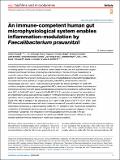An immune-competent human gut microphysiological system enables inflammation-modulation by Faecalibacterium prausnitzii
Author(s)
Zhang, Jianbo; Huang, Yu-Ja; Trapecar, Martin; Wright, Charles; Schneider, Kirsten; Kemmitt, John; Hernandez-Gordillo, Victor; Yoon, Jun Young; Poyet, Mathilde; Alm, Eric J.; Breault, David T.; Trumper, David L.; Griffith, Linda G.; ... Show more Show less
DownloadPublished version (3.629Mb)
Publisher with Creative Commons License
Publisher with Creative Commons License
Creative Commons Attribution
Terms of use
Metadata
Show full item recordAbstract
Crosstalk of microbes with human gut epithelia and immune cells is crucial for gut health. However, there is no existing system for a long-term co-culture of human innate immune cells with epithelium and oxygen-intolerant commensal microbes, hindering the understanding of microbe-immune interactions in a controlled manner. Here, we established a gut epithelium-microbe-immune (GuMI) microphysiological system to maintain the long-term continuous co-culture of <jats:italic>Faecalibacterium prausnitzii/Faecalibacterium duncaniae</jats:italic> with colonic epithelium, antigen-presenting cells (APCs, herein dendritic cells and macrophages), and CD4<jats:sup>+</jats:sup> naive T cells circulating underneath the colonic epithelium. In GuMI-APC condition, multiplex cytokine assays suggested that APCs contribute to the elevated level of cytokines and chemokines secreted into both apical and basolateral compartments compared to GuMI condition that lacks APC. In GuMI-APC with <jats:italic>F. prausnitzii</jats:italic> (GuMI-APC-FP), <jats:italic>F. prausnitzii</jats:italic> increased the transcription of pro-inflammatory genes such as toll-like receptor 1 (<jats:italic>TLR1</jats:italic>) and interferon alpha 1 (<jats:italic>IFNA1</jats:italic>) in the colonic epithelium, without a significant effect on cytokine secretion, compared to the GuMI-APC without bacteria (GuMI-APC-NB). In contrast, in the presence of CD4<jats:sup>+</jats:sup> naive T cells (GuMI-APCT-FP), <jats:italic>TLR1</jats:italic>, <jats:italic>IFNA1</jats:italic>, and <jats:italic>IDO1</jats:italic> transcription levels decreased with a simultaneous increase in <jats:italic>F. prausnitzii</jats:italic>-induced secretion of pro-inflammatory cytokines (e.g., IL8) compared to GuMI-APC-FP that lacks T cells. These results highlight the contribution of individual innate immune cells in regulating the immune response triggered by the gut commensal <jats:italic>F. prausnitzii</jats:italic>. The integration of defined populations of immune cells in the gut microphysiological system demonstrated the usefulness of GuMI physiomimetic platform to study microbe-epithelial-immune interactions in healthy and disease conditions.
Date issued
2024-03-29Department
Massachusetts Institute of Technology. Department of Biological Engineering; Massachusetts Institute of Technology. Department of Mechanical Engineering; Massachusetts Institute of Technology. Center for Gynepathology ResearchJournal
npj Biofilms and Microbiomes
Publisher
Springer Science and Business Media LLC
Citation
Zhang, J., Huang, YJ., Trapecar, M. et al. An immune-competent human gut microphysiological system enables inflammation-modulation by Faecalibacterium prausnitzii. npj Biofilms Microbiomes 10, 31 (2024)
Version: Final published version
ISSN
2055-5008